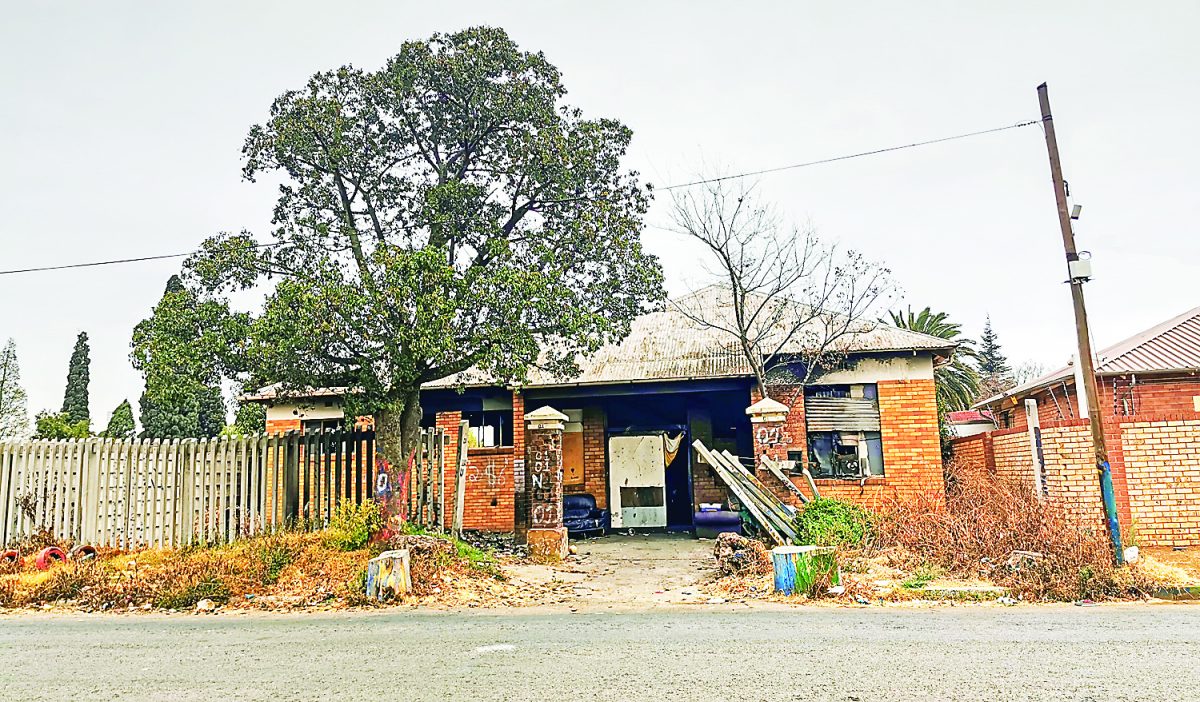click to dowload our latest edition
CLICK HERE TO SUBSCRIBE TO OUR NEWSLETTER


Published
4 years agoon
The building that used to be the ohel of the Jewish cemetery in Springs, Gauteng, is reported to be in a dire state, with vagrants occupying the former holy space now owned by the municipality. The situation highlights the vulnerability of facilities in former country communities.
“The building that was once the ohel has been invaded by vagrants and is in a shocking condition. More than 10 years ago, we applied to the local municipality to have it demolished. Because the municipality refused permission to demolish the building, we erected an eight foot wall (2.4m) to prevent vagrants from interfering with the more than 600 immaculately maintained Jewish graves,” says Rabbi Moshe Silberhaft, the former country communities rabbi of the South African Jewish Board of Deputies, and now chief executive of the Small Jewish Communities Association.
“When the ohel was vandalised and invaded, we asked to have it demolished. Until then, it remained locked and in good condition. The ohel is no longer the property of the Springs Hebrew Congregation Trust, and is owned by the council,” he says.
The graves in the Springs Jewish cemetery were vandalised in 2009 before a surrounding wall was built, Silberhaft says, but the cemetery is now restored and in perfect condition.
“The Springs Hebrew Congregation Trust spent more than R550 000 to secure every grave, and spends thousands of rand a month to ensure that the cemetery is kept in the condition it deserves. This has included setting all of the gravestones flat, securing a wall around the ohel, erecting a new wall around the entire cemetery, and removing all trees and grass for ease of maintenance.”
According to a report in the Springs Advertiser on 24 June 2020, “Residents say they want the house [the former Springs Jewish cemetery ohel] on 2099 Old Cemetery Road in First Avenue in Geduld to be torn down. Over the years, the structure has fallen apart, and has been taken over by homeless people.” When photographer Ilan Ossendryver went to take pictures of the structure for the SA Jewish Report, he found about 20 people living there.
“There’s no electricity, water, or toilets, people just do their business anywhere,” says resident Hendrik Booysen.
“PR [proportional representation] Councillor Lorna Beharie says following the complaints by residents in the area, she went to see the property in question.
“’The seemingly abandoned property has become home to vagrants who not only reside on the property, but also use the grounds to store and sort rubbish for recycling,’ she said. ‘I have contacted our shadow MMC [member of the mayoral committee] for environment and waste management, Ald André du Plessis, to look into this matter. Due to the poor living conditions, I will also be escalating this to the MMC for human settlements, councillor Lesiba Mpya, to look into the matter.’”
Silberhaft says vandalism of former ohels in country communities is a common problem across the country, and that the only solution, sadly, is to demolish them. “Otherwise the buildings are stripped of roof sheeting, doors, windows, toilets, hand basins, and vagrants move into them, as we see happen in Springs.”
Other ohels in country communities that have been vandalised include those in George, Bloemfontein, Welkom, Graaff-Reinet, and Mokopane. Among the many cemeteries where ohels have been demolished are De Aar, Vereeniging, and Brandfort, Silberhaft says.
“It’s sad to demolish a building that was once used for the sacred duty of preparing a person for their journey to the next world, where families spent their last moment with their loved ones, and what was often a proud, historic symbol of Jewish presence in the town. Sadly, after the local synagogue is sold and deconsecrated and when the last Jews leave, it’s the ohel that’s usually next to be deconsecrated, and often demolished,” he says.
He advises that if a community that is closing down decides to keep the ohel standing, “They must remove all items of Jewish historic importance – minute books, burial registers, siddurim, and so on – to prevent them from being damaged or stolen, and history being lost.
“We must acknowledge the efforts of the Springs trustees for their efforts to maintain the cemetery,” he says. “If people want to help, they can offer to raise funds to assist with the cemetery in which their loved ones are buried.”

Graham Brenner
Feb 16, 2023 at 4:19 pm
What is the tel number of the Springs Chevra?